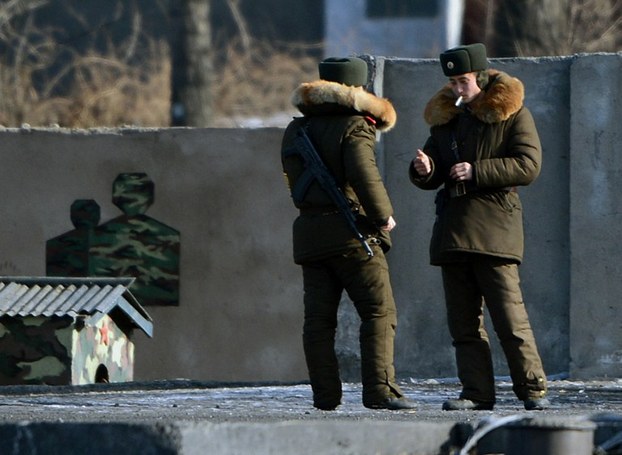Elite North Koreans evade army service
| Publisher | Radio Free Asia |
| Publication Date | 26 April 2013 |
| Cite as | Radio Free Asia, Elite North Koreans evade army service, 26 April 2013, available at: https://www.refworld.org/docid/5190dcda26.html [accessed 4 November 2019] |
| Disclaimer | This is not a UNHCR publication. UNHCR is not responsible for, nor does it necessarily endorse, its content. Any views expressed are solely those of the author or publisher and do not necessarily reflect those of UNHCR, the United Nations or its Member States. |
2013-04-26
The children of North Korea's privileged class are shirking their military duties in exchange for bribes, and officials are looking the other way, according to defectors and sources within the country.
 North Korean soldiers smoke cigarettes on the bank of the Yalu River across from the Chinese city of Dandong, Feb. 11, 2013. AFP
North Korean soldiers smoke cigarettes on the bank of the Yalu River across from the Chinese city of Dandong, Feb. 11, 2013. AFP
Those who hope to join the exclusive ruling Workers' Party must first serve in the North Korean People's Army, but, for a price, can get away with special treatment or are given cushy positions after donning fatigues, they said.
A source in North Korea's South Hamgyong province, near the country's border with China, told RFA's Korean Service that the problem of the elite avoiding conscription had become "severe," but has so far not led to any kind of official crackdown.
"Most parents in North Korea who have sons worry about them being drafted into the army, but that doesn't apply to wealthy and powerful people," the source said, speaking on condition of anonymity.
Young men in nuclear-armed North Korea are required to join the country's military and serve for a minimum of 10 years after graduating from high school. Young women who live in the capital Pyongyang must serve for two years after graduating, but those outside the city are not required to join.
But the regime under leader Kim Jong Un has faced severe food shortages exacerbated by international sanctions levied over recent rocket and nuclear tests, and feeding the impoverished nation's estimated 1.2 million-member army has not been easy.
Lack of resource support coupled with grueling work assignments for members of the military has led the majority of influential families to seek a way out of service for their children, largely through bribery.
The source said that the sons and daughters of those who can afford to pay are either passed over by the military or, if they serve, are given lengthy furloughs from duty or discharged from service early.
"If you have enough money, there are 100,000 ways to avoid military duty, such as enrolling in a college for art, technical skills, or foreign languages. These students receive a 'special education' ... that exempts them from service," the source said.
He said that scions of the powerful can also dodge the draft by obtaining false documents from a hospital certifying an illness.
"People who get exemptions using these methods don't care about becoming a member of the Workers' Party," the source said.
For those who hope to gain access to North Korea's inner circle by joining the Workers' Party, military service is mandatory, he said, "but they take an easy position through bribery and serve their duty at home, making up a fake illness or an excuse for special treatment."
Draft dodging 'on the rise'
A North Korean defector who gave his surname as Jang said "a lot of people" falsely report diseases in order to obtain a discharge from the military.
"In the past, people considered the act of dodging military service to be a dishonorable one, but recently this kind of thinking has changed. In fact, North Koreans now believe people who don't try to get out of service are foolish," he said.
"The bribery is not being addressed and draft dodging is on the rise among the privileged class."
Sources said that without a free media in the country to report on the issue of draft dodging, the practice is unlikely to be eliminated. But they said that even if the problem was brought to light, North Koreans would be too afraid of being persecuted by the authorities to discuss it.
They said that in addition to the punishing working environment and substandard rations, young men and women of conscription age are seeking ways to skirt military service because the benefits of joining the Workers' Party are no longer attractive.
North Korea's military was founded 81 years ago Thursday and is older than the country itself. It began as an anti-Japanese militia and is now the heart of the nation's "military first" policy.
North Korea, a country of about 25 million, has an estimated 7.7 million army reserves.
Kim Jong Un's father and predecessor Kim Jong Il, who died in December 2011, raised the military's profile during his 17 years in power.
The younger Kim this year instructed the Korean People's Army to focus on a "nuclear arms force," but it is believed to be operating on outdated materials and short supplies.
Reported by Joon Ho Kim for RFA's Korean Service. Translated by Goeun Yu. Written in English by Joshua Lipes.
Link to original story on RFA website
